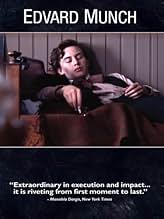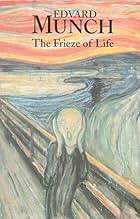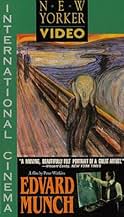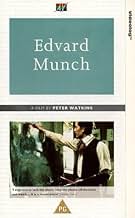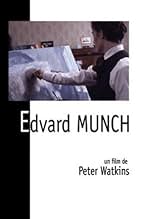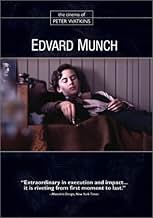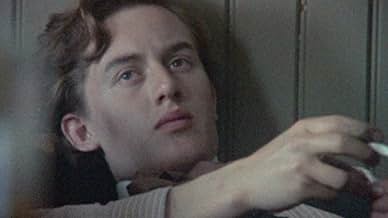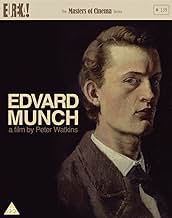This biopic of Norwegian Expressionist painter Edvard Munch focuses on the influences that shaped his art, his devastating affair with a married woman that will haunt him for the rest of his... Read allThis biopic of Norwegian Expressionist painter Edvard Munch focuses on the influences that shaped his art, his devastating affair with a married woman that will haunt him for the rest of his lifeThis biopic of Norwegian Expressionist painter Edvard Munch focuses on the influences that shaped his art, his devastating affair with a married woman that will haunt him for the rest of his life
- Won 1 BAFTA Award
- 2 wins total
- Inger Munch - 1875
- (as Anne Marie Dæhli)
- Director
- Writer
- All cast & crew
- Production, box office & more at IMDbPro
Featured reviews
UPDATE: ... Not sure why my comment cut off like that!
I am re-viewing this great film and find it just as astonishing as I did the first time through. The great _layering_ of image and sound (so that we see an oddly-cut sequence of a couple making love mixed with images of bloody sickbeds, all the while hearing Munch's palette knife scraping away or his distraught sobs) is employed to devastating effect, while the performances seem so naturalistic that it all feels less _acted_ than simply _filmed_ ... as if Watkins somehow managed to transport himself and camera back to 19th century Christiania. Absolutely spellbinding.
The eponymous Munch's (played, like all here by amateur actor Geir Westby) life and career is dealt with in the usual Watkins style, focusing largely on the period between 1884 and 1894, a period in which his painting developed into what would become Expressionism. It shows a young man struggling with shyness and emotional immaturity, one that when confronted with rejection from Fru Heiberg (Gro Fraas), a married woman who has affairs with bohemian types (the film constantly reminds us of the historical realities of women in 19th century Norway, who require men to live), Munch becomes jealous and possessive. The film juxtaposes these emotional moments of anguish and the tragedies of Munch family fatalities that struck the young throughout his early life, with the development of Munch's painting style. Watkins shows throughout the actual painting process. Beginning with the breathtaking picture The Sick Child, Watkins shows the anger and psychological torment that went into it. The ways in which Munch attacked to painting with knives or the non-bristle end of the brush, which created a startlingly bleak image, devoid of unnecessary details.
Of course, as with anything different within an artistic medium, Munch's stripped down aesthetic was not met with praise initially, and Watkins shows the various vitriolic reactions from the art establishment and critics, both through over-heard conversations in gallery spaces, and the filmed interviews with detractors. During these moments, Munch can be seen skulking on the periphery, further exacerbating his deteriorating psychology, but this imbalance and possible fastidiousness influences his further subversion of the classical painting style - and one that would lead to German Expressionism. Periodically the narrator will place historical facts against the period portrayed, and the film is certainly as much about history (sometimes in relation to contemporary politics), as it is about an artist.
The bohemian group that Munch spent time with, headed by anarchist Hans Jaeger, would openly discuss political and social issues. Even women would be part of this group, and along with the formal discussion, the "film crew" interview various female exponents, discussing feminism and the role of the female within society. Placed within this historical context, the present (at least in 1974 when the film was released) was in what appeared to be a new sexual revolution, and the feminist movement was a media convention, but in 19th century Europe, these women see what they are able to achieve living within the constraints of a male dominated society. Whereas prostitution (in the '70's it was pornography) is socially seen as immoral and degrading, these female thinkers see it as motivating, a process of female empowerment. In Edvard Munch the women are self-contained, they are individual and have power over their own lives. But this is not exclusively inclusive of female characters, it is also a film (through its documentary style) that includes the audience.
Munch is the best use that I have seen of Watkins' idiosyncratic documentary style, because it is an emotional exploration, as well as a political one. The emotional aspects are embellished by the characters acknowledgement of the viewer. Throughout the film the characters look directly into the camera, addressing the audience with a glance, at times to question their own actions (should we do this?), or by including the audience in the emotional events that are occurring, you always feel included, even when those moments are incredibly voyeuristic. I at times even felt that I should not be privy to this, such was the effect of this connecting barrier. Like much of Watkins' work (and himself as a figure), Edvard Munch has been marginalised. Watkins' criticism of mass media has clearly left him out of main stream publication, and his work (whilst now gaining distribution and serious praise) is difficult to see commercially. Originally made for a Norwegian/Swedish television co-production, the film lost distribution due to the studios refusal to play it. The film did received an international release in a shortened version, but the 221 minute version is now accessible. It sounds exhausting, but the majesty and emotional connection the film presents makes it a beguiling and moving experience, and it is easily the most in depth exploration of the artistic process.
www.the-wrath-of-blog.blogspot.com
Did you know
- TriviaThis film has a 100% rating based on 13 critic reviews on Rotten Tomatoes.
- Quotes
Narrator: I felt as if there were invisible threads between us. I felt as if invisible threads from her hair still twisted themselves around me. And, when she completely disappeared there, over the ocean, then I felt still how it hurt, where my heart bled, because the threads could not be broken.
- ConnectionsReferenced in A Discussion with Peter Watkins (1977)
Details
Box office
- Gross US & Canada
- $43,539
- Opening weekend US & Canada
- $3,961
- Jun 19, 2005
- Gross worldwide
- $76,949

